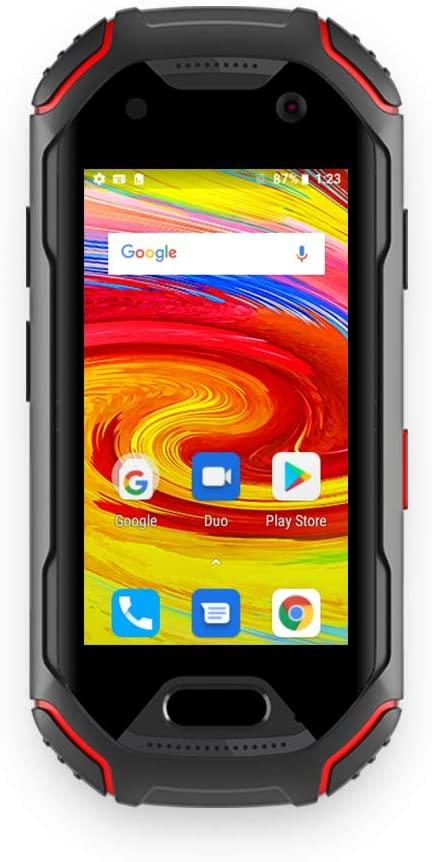Not every phone can survive a tumble. Nokia phones from the bygone era are remembered for their ruggedness. Toss them down a flight of stairs accidentally, carelessly elbow off a table, or absentmindedly drop down a shaft, and chances were they would survive without even a scratch. The same couldn’t be said for many other phones except perhaps certain BlackBerry phones.
There is an attempt by Nokia to bring back those days of carefree phone use, with the Nokia XR20. Yet, you must stop and consider the price tag, and how important ruggedness is for you. While you think, keep this in mind— ₹46,999.
Before you have visions of a phone that resembles a brick, with thicker padding around the four edges of the frame, hold on. Nokia has done the visual lines quite well while giving the innards some serious padding. It will be a bit thicker and heavier than your regular Android phone, but you can think of this as a phone with a cover, except it’s integrated into the casing. The ruggedness aspect doesn’t get in the way of looking good.
But this is where things get a bit complicated. The price tag of ₹46,999 takes us into the territory of the OnePlus 9 series, Samsung Galaxy S20 FE, Xiaomi Mi 11X Pro 5G, and the Vivo X70 Pro. In comparison, the XR20 gives the impression it is bringing a knife to a gunfight, with the Qualcomm Snapdragon 480 5G processor, 6GB RAM, and 128GB storage.
All the alternatives mentioned here have 8GB RAM, which simply helps with performance in the long run, and much more powerful processors comparatively, which is good for longevity. This is not in the same league. Except none of the rivals are as rugged as this. This is getting really complicated.
The biggest worry with the Nokia XR20 is whether it can hold its performance poise. It isn’t keeping up with the rivals on the spec sheet that is well established already. But can it hold up to the app and multitasking load you’d put it through on a regular basis. It is quite pleasant that the Snapdragon 480 5G does manage to pull along considerable load before you start to notice the virtual ceiling looming over the horizon.

Most apps open quickly enough and can keep up with a bunch of apps being switched around at the same time. Yet, you cannot ignore occasional slowdowns and the sporadic appearance of choppy transitions as you use apps.
The Nokia XR20 is made to be compatible with MIL-STD-810H military standard and the polymer composite joins the aluminum frame and the aluminum back panel. You’d notice the impact dissipating bumpers on the corners too, which should further prevent impact from running the length of the phone in case it goes crashing into concrete.
At the front is the Corning Gorilla Glass Victus, which is the latest from Corning and something that Android flagship phones are expected to have now. Not that the screen won’t shatter if you are unlucky, just that it is more resistant to that, as well as scratches and dings.
The 6.67-inch size makes this a comfortable screen for reading and viewing media. It is bright, feels adequately vivid and doesn’t fall short on crispness. The resolution is 2400 x 1080, which incidentally is in the range of the Vivo X70’s 2376 x 1080 pixels for that 6.56-inch screen. The peak brightness is rated at 550 nits—in the real world, this can keep up under bright sunlight and can negate most reflections. It is a plain LCD screen, and may not really match up to OLED screens.
The dual cameras at the back are a 48-megapixel wide and primary camera as well as a 13-megapixel ultrawide camera. As you’d expect in a Nokia phone, the optimizations are done by Zeiss (as they have for years now). Do keep in mind that the shutter speed isn’t exactly quick, and you’d need to hold on to the pose for a second longer as the camera processes the image you’ve just taken.
Photographs are a case of two distinct halves. Daytime and good light photos are vibrant and there is a genuine attempt to reproduce the finer details too. The dynamic range could have been a bit better, perhaps an observation accentuated by the blacks not being as deep as we would have liked. Low light photos are more a case of how patient you are—switching to the higher resolution 48-megapixel mode helps pull in more data for the image processing to work with.
The Nokia XR20 doesn’t have a parallel in the Android smartphone space. It isn’t a flagship Android phone, though it is priced as one. There is no phone as rugged as this, even though this doesn’t have a superphone price tag either. You’d be really standing out in a crowd if you pick the Nokia XR20 over everything else.
It could have had a more palatable price tag because as things are, you are forced to think how much of a premium you’d want to pay for the assurance of ruggedness. Yet for what it promises to do, the Nokia XR20 isn’t shying away from delivering. A phone that isn’t afraid to fall and rise back up again.
